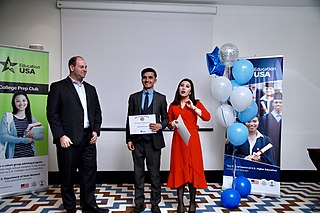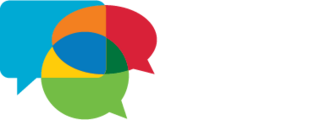
International students or exchange students, also known as foreign students, are students who undertake all or part of their secondary or tertiary education in a country other than their own.
The Fulbright Program, including the Fulbright–Hays Program, is one of several United States Cultural Exchange Programs with the goal of improving intercultural relations, cultural diplomacy, and intercultural competence between the people of the United States and other countries through the exchange of persons, knowledge, and skills. Via the program, competitively-selected American citizens including students, scholars, teachers, professionals, scientists, and artists may receive scholarships or grants to study, conduct research, teach, or exercise their talents abroad; and citizens of other countries may qualify to do the same in the United States.

A student exchange program is a program in which students from a secondary school or higher education study abroad at one of their institution's partner institutions. A student exchange program may involve international travel, but does not necessarily require the student to study outside their home country.
Some students from the United States pursue educational opportunities outside the United States. This can include primary, secondary and post-secondary students.

Benjamin Arthur Gilman was an American politician and Republican member of the United States House of Representatives from Middletown, New York, from January 3, 1973, to January 3, 2003.

The National University of Modern Languages (NUMLs) (Urdu: قومی جامعہ جدید زبانیں) is a multi-campus public university with its main campus located in Islamabad, Pakistan and other campuses in different cities of Pakistan.

The Bureau of Educational and Cultural Affairs (ECA) of the United States Department of State fosters mutual understanding between the people of the United States and the people of other countries around the world. It is responsible for the United States' cultural exchange programs.
The Council on International Educational Exchange (CIEE) is a non-profit organization promoting international education and exchange. It was founded in 1947 and is based in the United States. The organization is headquartered in Portland, Maine.

EducationUSA is a US Department of State network of international student advising centers in more than 170 countries. Officially a branch of the Office of Global Educational Programs, a part of the Bureau of Educational and Cultural Affairs (ECA), the ECA fosters mutual understanding between the United States and other countries by promoting personal, professional, and institutional ties between private citizens and organizations in the United States and abroad, as well as by presenting U.S. history, society, art and culture to overseas audiences.

Mongolia International University is a private institution of tertiary education located in Ulaanbaatar, Mongolia. It was established in 2002 on land gifted to it by the former Mongolian president Natsagiin Bagabandi. It is an English-speaking university that offers 14 recognized bachelor’s programs.

The National Security Language Initiative for Youth (NSLI-Y) is a US Department of State ECA program launched in 2006 by President George W. Bush to develop the foreign language skills of American high school students in eight critical-need languages. Korean, Mandarin, Russian, Arabic, Hindi, Bahasa Indonesian, Tajiki, and Turkish are all taught in summer and academic year programs abroad. NSLI-Y is the most prestigious foreign language program available to American high schoolers and many alumni go on to study at Ivy League institutions as well as hold high positions in government and a variety of industries worldwide.

The Center for Global Initiatives (CGI) is a research center at the University of North Carolina at Chapel Hill. It is part of the National Resource Center program of the U.S. Department of Education. CGI offers grants and scholarships to students and faculty to travel abroad, complete internships, and develop internationally focused courses. CGI also serves as the home to the Fulbright Program at UNC-Chapel Hill.
The Critical Language Scholarship (CLS) Program is a United States Department of State cultural and educational exchange program which offers approximately 500 undergraduate or graduate level students from the United States the opportunity to participate in an intensive language study abroad. This nationally competitive program funds students who study one of the 15 critical need foreign languages, and is part of the National Security Language Initiative. The 15 critical languages include Arabic, Azerbaijani, Bengali, Chinese, Hindi, Indonesian, Japanese, Korean, Persian, Portuguese, Punjabi, Russian, Swahili, Turkish and Urdu. With an acceptance rate of less than 10%, the Critical Language Scholarship is one of the most competitive scholarships in the U.S. and the most prestigious language program for U.S. citizens.
United States cultural exchange programs, particularly those programs with ties to the Bureau of Educational and Cultural Affairs (ECA) of the United States Department of State, seek to develop cultural understanding between United States citizens and citizens of other countries. Exchange programs do not necessarily exchange one individual for another individual of another country; rather, "exchange" refers to the exchange of cultural understanding created when an individual goes to another country. These programs can be regarded as a form of cultural diplomacy within the spectrum of public diplomacy.
The Commission for Educational Exchange between the United States of America, Belgium, and Luxembourg is located in Brussels, Belgium, with the office situated at the Royal Library Albert I. It is a not-for profit organization that is responsible for administering Fulbright grants for citizens of Belgium and Luxembourg. It also serves as the EducationUSA Advising Center in Belgium.

The Kennedy Lugar Youth Exchange and Study Programs (KL-YES) are fully-funded student exchange programs administered by the U.S. Department of State. YES includes the "inbound" program for students from close to 40 Muslim majority countries to study and live in the U.S., and the "outbound" program, called YES Abroad, for students from the U.S. to study in selected YES countries.

The School for International Training, widely known by its initials SIT, is a private non-profit regionally-accredited institution headquartered in Brattleboro, Vermont, United States. The institution has two main divisions. SIT Graduate Institute administers a wide range of internationally-focused master's degree programs as well as a Doctor of Education degree in Global Education. SIT Study Abroad administers undergraduate study abroad programs which combine field-based experiential learning with academic research or internship opportunities.
Edmund S. Muskie Graduate Fellowship Program was a program of the Bureau of Educational and Cultural Affairs of the United States Department of State in 1992–2013.
A scholarship is defined as a grant or payment made to support a student's education, awarded on the basis of academic or other distinction. "Scholarship" has a different meaning in the United States than it does in other countries, with the partial exception of Canada. Outside the U.S., scholarship is any type of monetary award to fund education. In the United States, the only country with a national system that determines a student's financial need, and where universities are far more expensive than in other countries, a scholarship is money for which the student must qualify in some way, and the term "grant" - an award the student receives because of financial need - is used for what in other countries are called scholarships.
Newcomer education is the specialized teaching of refugees, migrants, asylees and immigrants who have resettled in a host country, with the goal of providing the knowledge and skills necessary to integrate into their country of refuge. Education is the primary way by which newcomers can adjust to the linguistic, social, and cultural environments of their new communities. Newcomer education aims to empower newcomers with a sense of self-efficacy and social integration, as well as giving them the skills to pursue employment or higher education. Newcomer education also aims to help address trauma, culture shock, and other negative effects of forced displacement. Education for newcomers can provide long-term prospects for stability of individuals, communities, countries and global society.










